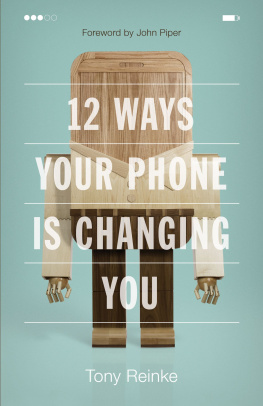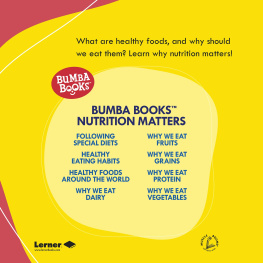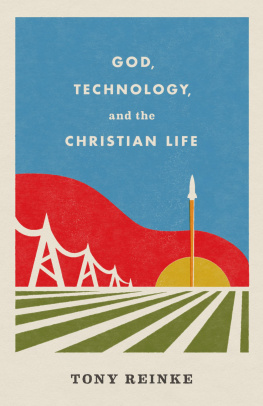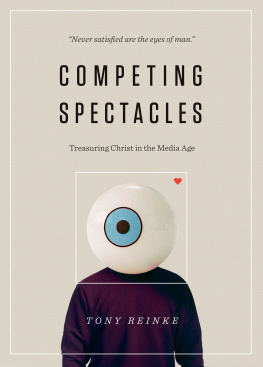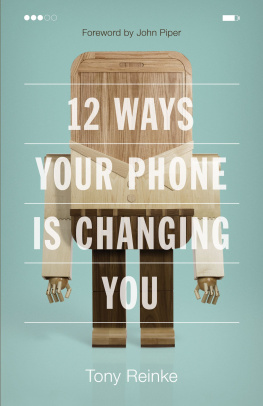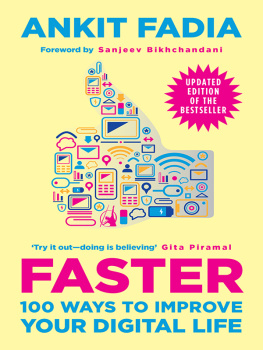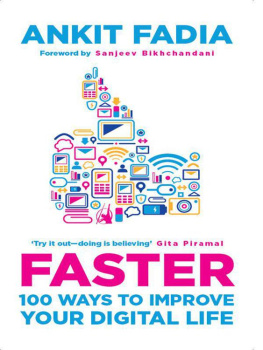Reinke - 12 ways your phone is changing you
Here you can read online Reinke - 12 ways your phone is changing you full text of the book (entire story) in english for free. Download pdf and epub, get meaning, cover and reviews about this ebook. year: 2017, publisher: Crossway, genre: Religion. Description of the work, (preface) as well as reviews are available. Best literature library LitArk.com created for fans of good reading and offers a wide selection of genres:
Romance novel
Science fiction
Adventure
Detective
Science
History
Home and family
Prose
Art
Politics
Computer
Non-fiction
Religion
Business
Children
Humor
Choose a favorite category and find really read worthwhile books. Enjoy immersion in the world of imagination, feel the emotions of the characters or learn something new for yourself, make an fascinating discovery.
12 ways your phone is changing you: summary, description and annotation
We offer to read an annotation, description, summary or preface (depends on what the author of the book "12 ways your phone is changing you" wrote himself). If you haven't found the necessary information about the book — write in the comments, we will try to find it.
Reinke: author's other books
Who wrote 12 ways your phone is changing you? Find out the surname, the name of the author of the book and a list of all author's works by series.
12 ways your phone is changing you — read online for free the complete book (whole text) full work
Below is the text of the book, divided by pages. System saving the place of the last page read, allows you to conveniently read the book "12 ways your phone is changing you" online for free, without having to search again every time where you left off. Put a bookmark, and you can go to the page where you finished reading at any time.
Font size:
Interval:
Bookmark:
Thank you for downloading this Crossway book.
Sign-up for the Crossway Newsletter for updates on special offers, new resources, and exciting global ministry initiatives:
Crossway Newsletter
Or, if you prefer, we would love to connect with you online:
|
|
|
|
Introduction
The moment when my first smartphone caught a wireless email outside that blustery rest stop in the Iowa cornfields is not where the story of this book begins. The launch of the iPhone at Macworld Expo 2007 is not far back enough either. Neither is the beginning of Apple or the birth of Steve Jobs. To see the timeline of the smartphone, we need a quick glance at the history of technology as it stretches back over the centuries. Our digital age is no cosmic accident.
The Story of Technology
In the beginning, God created So when Adam and Eve awoke and walked into the garden, an unseen, much larger plan was also set in motion. The untilled garden would become a glorious city.
But between the muddy rural beginning of the garden and the gleaming urban finale, we must fill in the story, because thats where we find ourselves: east of Eden, west of the Great City, journeying now in Gods sovereignly guided history, holding smartphones. As the broader history of technology unfolds, the Bible teaches us nine key realities we must rehearse to ourselves in the digital age.
1. Technology modifies creation
Gods commission to the first couple, to garden the globe and to raise animals, implied a series of technological advances that would make all of this work possible through stone tools, then copper tools, and then iron tools.
Unlike his other creatures, Gods image bearers would grow food strategically. By design, agricultural advances began rather quicklya trajectory of shovels, sickles, and horse - drawn plows, and then tractors, irrigation systems, and now GPS - guided (and GPS -driven!) equipment. Technology is used to subdue creation for human good, but also to increase efficiency. Todays agriculture is not perfect, and it raises moral questions, but the long train of technological advances here is especially illuminating and stunning.
Farming also is one example of technology built from the Creators intelligence (given to mankind) and creations abundance (supplied in the earth). Technology is the reordering of raw materials for human purposes. Adam and Eve reordered the raw materials of soil in order to make plants and flowers flourish. Today, chefs and cooks reorder the raw materials of foods into delicious meals. Framing carpenters reorder raw materials of lumber and nails to form homes. Pharmaceutical chemists reorder organic and synthetic elements into healing drugs. Musicians reorder notes and sounds into music. Novelists reorder the raw material of human experience into stories. As a writer of nonfiction, I reorder the raw materials of words and ideas for a publisher, which then reorders wood pulp, black ink, and binding glue into a book for you to hold and read. All of this is technology.
2. Technology pushes back the results of the fall
Not long into the story of the world, Adam and Eve made the tragic mistakecommitting the inexplicable
That breakdown still affects us todayweeds in the crops, pain in the delivery room, and embarrassment in nakedness. Farmers use weed - killing technology to minimize thorns and thistles on the farm. Women use pain - suppressing technology in childbirth. Fashion designers use fabric to cover our bodies. The sweep of technological advance is a gracious gift from God to help us live in a fallen creation. But all of this technology also reminds us of our fundamental problemwe are sinfully alienated from God.
3. Technology establishes human power
Unhitched from fear and obedience to God, technology quickly becomes a pawn in To own iron mines and employ blacksmiths was to control an endless supply of new weaponry, and to control an endless supply of new weaponry was to flex military superiority, and to flex military superiority was to wield power over rival nations. Bows, arrows, iron, and gunpowder all give power to defend and conquer. The same holds true today. Power and superiority rest on technology: atomic weapons, warships, drones, fighter jets, and missiles. The larger a nations military, the more power it can wield in the world. Such a quantifiable and scalable power is possible only through technological innovation.
4. Technology helps to edify souls
In the biblical storyline, innovations also serve worshipers.
Later, the temple of Israel exhibited years of advances in building technology, metallurgy, and artistic craftsmanship. The greatness and the majestic scale of the temple proclaimed to the nations the glory, greatness, and splendor of Israels God.
As Gods plan moved from a come -and- see religion (Old Testament) to a go -and- tell focus (New Testament), chisel and stone gave way to primitive advances in paper and ink, making it possible for written communications technology to advance. Gods words, first scratched in stone, then on processed animal skins, and then on products of trees, would become the Creators centerpiece for drawing together his people separated by continents, languages, and millennia. Over time, the many scrolls of the Old Testament and the many books and letters of the New Testament were gathered into a codex, translated, and mass - published as a single book of unified authority that we now conveniently carry in one hand. Every time we open our Bibles, our souls are being fed through centuries of technological advancement.
From trumpets and temples to gold - edged Bibles, God intended technology to play an essential role for us to know and worship him.
5. Technology upholds and empowers our bodies
Technological advances change and refine our bodies in very dramatic ways, too. Eyeglasses and hearing aids boost our senses of seeing and hearing. Musical technology, such as the violin, fine - tunes human motor skills and gives us new purposes for the microrefined movements of our bodies. Industrial technology connects our hands to the hydraulic arms of digging machines. Medical technology starts stopped hearts and sustains dying bodies. Advances in medicine cure diseases and slow terminal illnesses. And advances in clothing make it possible for us to adorn our bodies in ways that define and shape the identities we project to one another.
Technology enhances our bodies, refines our movements, amplifies our actions, and shapes how we present ourselves to the world.
6. Technology gives voice to human autonomy
The good -bad- ugly mix of technology came to a particularly obnoxious expression at the More than a simple skyscraper, Babel was a new empire with a central city unified around a temple (the tower), all dedicated to the worship of human progress. Suppressing Gods ingenuity in all human advances, Babel was mans attempt to hijack technology and to fabricate an entire society and religious life in rebellion to the Creator.
unbelief. God is the genesis of all knowledge and technological advance, and he is the author and finisher of a glorified city to come. Why would a mud skyscraper impress him?
Technology is not inherently evil, but it tends to become the platform of choice to express the fantasy of human autonomy.
7. God governs every human technology
Next pageFont size:
Interval:
Bookmark:
Similar books «12 ways your phone is changing you»
Look at similar books to 12 ways your phone is changing you. We have selected literature similar in name and meaning in the hope of providing readers with more options to find new, interesting, not yet read works.
Discussion, reviews of the book 12 ways your phone is changing you and just readers' own opinions. Leave your comments, write what you think about the work, its meaning or the main characters. Specify what exactly you liked and what you didn't like, and why you think so.

